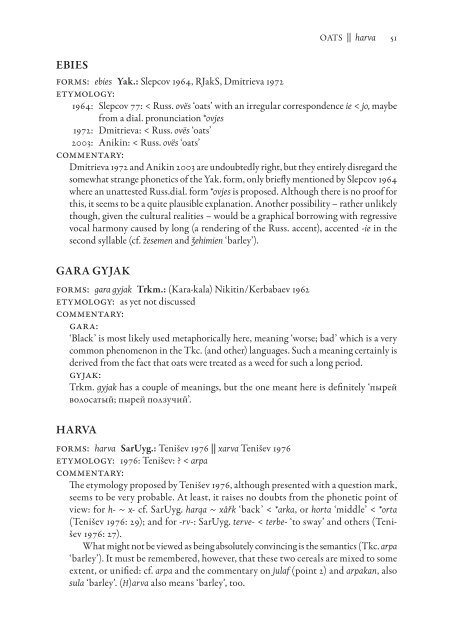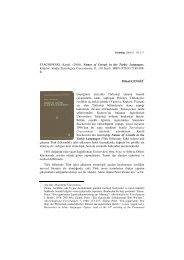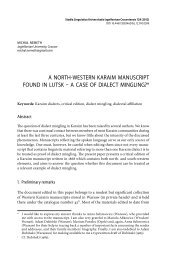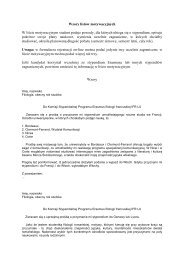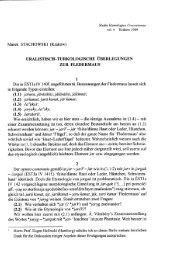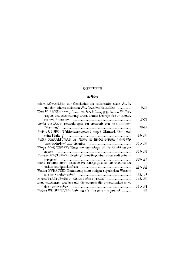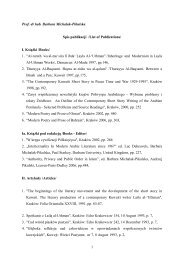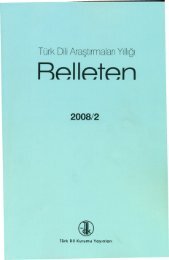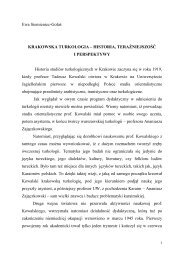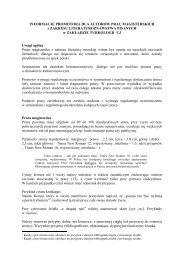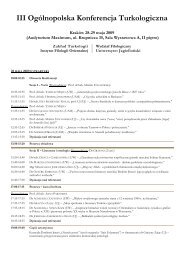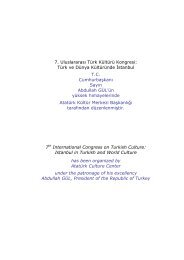Oats || harva 51ebiesforms: ebies Yak.: Slepcov 1964, RJakS, Dmitrieva 1972etymology:1964: Slepcov 77: < Russ. ovës ‘oats’ with an irregular correspondence ie < jo, maybefrom a dial. pronunciation *ovjes1972: Dmitrieva: < Russ. ovës ‘oats’2003: Anik<strong>in</strong>: < Russ. ovës ‘oats’commentary:Dmitrieva 1972 and Anik<strong>in</strong> 2003 are undoubtedly right, but <strong>the</strong>y entirely disregard <strong>the</strong>somewhat strange phonetics <strong>of</strong> <strong>the</strong> Yak. form, only briefly mentioned by Slepcov 1964where an unattested Russ.dial. form *ovjes is proposed. Although <strong>the</strong>re is no pro<strong>of</strong> forthis, it seems to be a quite plausible explanation. Ano<strong>the</strong>r possibility – ra<strong>the</strong>r unlikelythough, given <strong>the</strong> cultural realities – would be a graphical borrow<strong>in</strong>g with regressivevocal harmony caused by long (a render<strong>in</strong>g <strong>of</strong> <strong>the</strong> Russ. accent), accented -ie <strong>in</strong> <strong>the</strong>second syllable (cf. žesemen and ǯehimien ‘barley’).gara gyjakforms: gara gyjak Trkm.: (Kara-kala) Nikit<strong>in</strong>/Kerbabaev 1962etymology: as yet not discussedcommentary:gara:‘Black’ is most likely used metaphorically here, mean<strong>in</strong>g ‘worse; bad’ which is a verycommon phenomenon <strong>in</strong> <strong>the</strong> Tkc. (and o<strong>the</strong>r) languages. Such a mean<strong>in</strong>g certa<strong>in</strong>ly isderived from <strong>the</strong> fact that oats were treated as a weed for such a long period.gyjak:Trkm. gyjak has a couple <strong>of</strong> mean<strong>in</strong>gs, but <strong>the</strong> one meant here is def<strong>in</strong>itely ‘пырeйволосатый; пырeй ползучий’.harvaforms: harva SarUyg.: Tenišev 1976 || xarva Tenišev 1976etymology: 1976: Tenišev: ? < arpacommentary:The etymology proposed by Tenišev 1976, although presented with a question mark,seems to be very probable. At least, it raises no doubts from <strong>the</strong> phonetic po<strong>in</strong>t <strong>of</strong>view: for h- ~ x- cf. SarUyg. harqa ~ xåřk ‘back’ < *arka, or horta ‘middle’ < *orta(Tenišev 1976: 29); and for -rv-: SarUyg. terve- < terbe- ‘to sway’ and o<strong>the</strong>rs (Tenišev1976: 27).What might not be viewed as be<strong>in</strong>g absolutely conv<strong>in</strong>c<strong>in</strong>g is <strong>the</strong> semantics (Tkc. arpa‘barley’). It must be remembered, however, that <strong>the</strong>se two cereals are mixed to someextent, or unified: cf. arpa and <strong>the</strong> commentary on julaf (po<strong>in</strong>t 2) and arpakan, alsosula ‘barley’. (H)arva also means ‘barley’, too.
52 julaf || OatsStebl<strong>in</strong>-Kamenskij 1982: 36 suggests that Yazg. and OVanj. xarban ‘millet’ is somehowconnected with Tkc. arpa ‘barley’, though <strong>the</strong> SarUyg. form is not listed among<strong>the</strong> Tkc. words. Due to its <strong>in</strong>itial x- ~ h-, it is precisely this form that appears to be <strong>the</strong>closest to <strong>the</strong> Pamir. words. However, semantics might raise much more serious doubtshere, than <strong>in</strong> <strong>the</strong> case <strong>of</strong> a simple comparison <strong>of</strong> SarUyg. and Tkc. forms.julafforms:jolap Tat.Gr.: Podolsky 1981julaf Az.: RAzS, KTLS, Dmitrieva 1972, ‘oats, oats flour’ ÈSTJa || Gag.: ÈSTJa ||KarC: ÈSTJa || Ott.: Wiesentahl 1895, Redhouse 1921 || Tat.: یوالف R III 555m,Tanievъ 1909 || Tksh.: KTLS, Dmitrieva 1972*ǯilap CTat.: Zaatovъ 1906 (<strong>in</strong>: ǯilaply ‘made <strong>of</strong> oats’)ǯylap KarC: ÈSTJalanguages:Az.: julaf || CTat.: *ǯilap || Gag.: julaf || KarC: julaf, ǯylap || Ott.: julaf || Tat.: julaf ||Tat.Gr.: jolap || Tksh.: julafetymology:1969: VEWT: only mentions <strong>the</strong> word, without provid<strong>in</strong>g any etymology1974: ÈSTJa: (?) < Pers. جو ǯou ~ ǯav ‘barley’, Talyš ǯəv-, dial. jəv + Pers. عَلَف [äläf]‘grass; fodder’, Talyš alaf ‘grass’ (< Arab.); so julaf < *ju (< jəv) + alaf / ələf [sic]‘barley’ + ‘hay’ (< ‘grass’)commentary:The etymology proposed by ÈSTJa seems a little strange from both phonetic andsemantic po<strong>in</strong>t <strong>of</strong> view:1. We can see no reason, why Pers.dial. jəv should render *ju <strong>in</strong> Tkc.2. In <strong>the</strong> Tkc. languages, noun + noun compounds – such as <strong>the</strong> one suggested byÈSTJa – render <strong>in</strong> <strong>the</strong> great majority <strong>of</strong> mean<strong>in</strong>gs a material someth<strong>in</strong>g is made<strong>of</strong>, or a comparison to someth<strong>in</strong>g. Therefore, <strong>the</strong> mean<strong>in</strong>g one should expect fromsuch a form should ra<strong>the</strong>r be ‘barley grass’, ‘grass such as barley’ and <strong>the</strong> like. Fromthis po<strong>in</strong>t, <strong>the</strong> road to ‘barley’ is not long. Particularly <strong>in</strong> that, as it is noted byÈSTJa, <strong>in</strong> many languages <strong>in</strong>clud<strong>in</strong>g Pers. and Taj., <strong>the</strong> name for ‘barley’ evolved<strong>in</strong>to ‘oats’, or <strong>the</strong> name for ‘oats’ orig<strong>in</strong>ates from <strong>the</strong> name for ‘barley’, cf. Klmk.dial. arva ‘oats’ (Tkc. ‘barley’), and Ma. arfa ‘oats; barley’; cf. also arpakan and harva,also sula ‘barley’. All this is fairly understandable with regard for <strong>the</strong> history <strong>of</strong> oats(see commentary at <strong>the</strong> beg<strong>in</strong>n<strong>in</strong>g <strong>of</strong> <strong>the</strong> chapter).However, none <strong>of</strong> this <strong>in</strong>formation can expla<strong>in</strong> why ÈSTJa assumes a shift from‘grass’ to ‘hay’ on <strong>the</strong> Tkc. ground.Deriv<strong>in</strong>g julaf from a compound <strong>of</strong> Pers. ǯou ~ ǯav or Pers.dial. jəv seems to have anadvantage from <strong>the</strong> po<strong>in</strong>t <strong>of</strong> view <strong>of</strong> <strong>the</strong> Tkc. j- ~ ǯ- alternation <strong>in</strong> anlaut but it createsano<strong>the</strong>r phonetic obstacle (see above) which we believe is quite serious.


